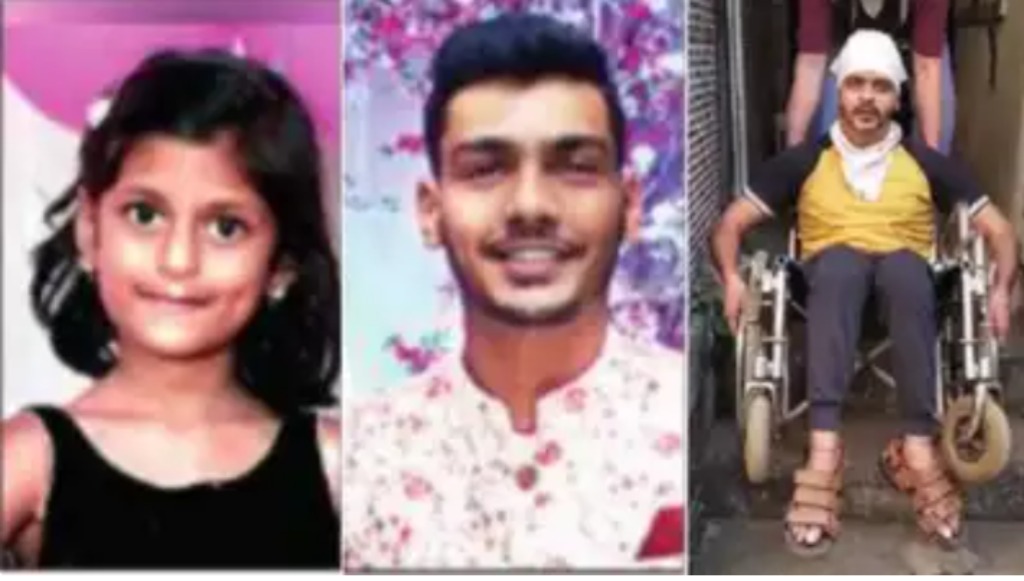Image caption: (L-R) Teertha (11) and Dikshant (21) died in crashes; Rahil (38) is in a wheelchair
Reproduced from Times of India. Story by Nitasha Natu.
MUMBAI: Teertha Patel would have turned 12 this month. The days in the run up to her birthday were always spent by the family together. But this year, her father, Nitin, spent the time doing rounds of a police station instead. Nitin has been on a crusade to get justice for his daughter who was killed in a road crash on February 1. The father-daughter duo had stepped out to feed birds at Kandivali East when a speeding motorcyclist rammed into them.
Like Teertha, 21-year-old Dikshant Mhashelkar was also a victim of speeding. An employee of a five-star hotel and the sole earning member in his family, Dikshant was riding home from work when a truck hit his motorcycle at Goregaon East on April 15. The truck driver later admitted to the Mhashelkar family that he wasn’t able to control the speed of his vehicle in time. Seven months since the crash, the truck driver has been released on bail but the Mhashelkars are still struggling to come to terms with their loss.
On World Day of Remembrance for Road Traffic Victims observed on November 21, both families want the authorities to promote action to curb speeding and eventually stop further crash deaths.
“Redesigning streets to prioritize vulnerable road users and lower speeds is the most effective tool to reduce traffic fatalities on our streets,” said Abhimanyu Prakash, senior programme manager with US-based National Association of City Transportation Officials (NACTO), a partner of the Bloomberg Philanthropies lnitiative for Global Road Safety. Globally, cities are lowering their urban speed limits through a combination of policy frameworks, enforcement, street design and communication. “There is ample data representing their success in reducing traffic crashes. Street design and infrastructural changes act as a self-enforcing tool, reducing room for error and creating space for managing crashes that might still happen due to human error,” Prakash said.
A report released in 2020 by the lnternational Road Assessment Programme (iRAP), a registered charity, shows that 879 lives are lost in lndia per day and the financial cost to the health system, economy and families could run up to 707 million USD daily. The report also shows that on 96% of lndian roads, that are used by pedestrians and where traffic flows at 40kmph or more, there are no formal footpaths.
“We have been campaigning for greater focus on prevention of injuries and disabilities caused by road crashes. lf scoop stretchers (an ideal device for carrying casualties with possible spinal injuries) can be placed at crash-prone locations and basic training is given to citizens on how to carry crash victims correctly and move them to hospitals within the golden hour, we could prevent permanent disabilities,” said Dr Ketna Mehta, whose non-profit group, Nina Foundation, works for individuals with spinal cord injuries. Mehta adds that a majority of people that her non-profit helped rehabilitate over the years, had suffered spinal cord injuries as a result of road crashes.
The annual cost of fatalities and serious injuries is 5.6 per cent of lndia’s GDP, according to the iRAP report. By investing 0.26% of the GDP annually from 2020 to 2030, fatalities and serious injuries can be reduced, the report suggests.
For some of the survivors of road crashes, getting through their daily routine has become an uphill task. Rahil Shaikh, who was rendered paraplegic after a vehicular collision in 2005, had to drop out of college and could barely find any employment opportunities thereafter. Shaikh, 38, is wheelchair-bound and does not venture out of his house at Dockyard Road on his own as “Mumbai streets not being universally accessible are dangerous for the disabled.”
For the same reason, he cannot take a train or bus, which severely limits his work options. “One of the objectives of World Day of Remembrance for Road Traffic Victims is also to advocate for better support for survivors of traffic crashes. Losing control over bodily functions among individuals with spinal cord injuries could have an impact on their mental health as well,” added Dr Mehta.


















